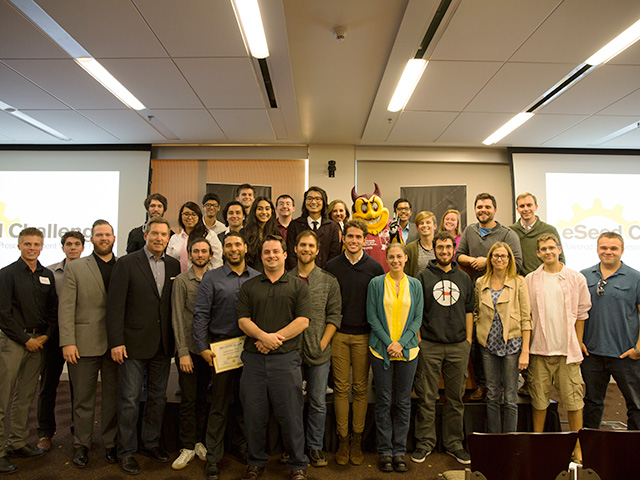
Innovators shine, earn funding through eSeed Challenge

Above: Student entrepreneurs participating in the eSeed Challenge gather with Tom Prescott (bottom row, fourth from left), the program’s benefactor.
Fifteen teams of student entrepreneurs pitched their business startup ideas Nov. 19 to a panel of experts, in hopes of earning funding to help them reach the next steps in their ventures.
The ideas were as varied as they were impressive. Swarming robots aimed to help search and rescue workers. Mobile applications that generate business leads for trade show vendors. A healthcare diagnostic solution targeted at markets in the third world. A mouth guard for athletes to help identify potential head traumas.
It was all in the name of innovation and the eSeed Challenge, the premiere program of the new Fulton Schools of Engineering Startup Center. The program is made possible through a $100,000 gift from Tom and JoAnn Prescott. Tom Prescott is a Fulton Schools of Engineering alum and former CEO and director of Align Technologies, Inc.
Earlier this fall, 30 teams were selected and given initial seed funding of $1,000 to support their ventures. At the eSeed Challenge Demo Day, after months of work, the top 15 teams had to give a seven-minute pitch to a panel of experts, with an additional three minutes given to the judges for questions. Ten of the teams were selected to receive an additional $5,000 in funds and admission into the eSeed Accelerator to further their ventures.
“I am extremely proud of all of the student startup founders who competed within our inaugural eSeed Challenge program this fall. These students lead extremely busy lives—juggling school, a startup, boyfriends, girlfriends, family and a wide array of other things,” said Brent Sebold, director of the Startup Center. “Not only did we expect them to quickly conduct a thousand dollars’ worth of marketplace experiments over the past three months, but we also assigned an industry mentor to breathe down their necks and hold them accountable along the way. They all persevered and shined during our culminating Demo Day event.”
Before the presentations, the teams attended a luncheon to commemorate the Startup Center’s launch. Tom Prescott told the ballroom audience that failure often comes hand in hand with innovation and success.
“You ought to prize your failures, hopefully they are all small ones,” Prescott said. “Every CEO job I ever interviewed for, they wanted to go back and look at my biggest failures. They wanted to know what I learned and what I would do differently. Those are the seeds for the great lessons you learn that can wire you for the rest of your life.”
In announcing the winners, Prescott urged the five teams that did not advance to keep fighting. It might be a failure now, he said, but ultimately it could be the learning experience needed to move forward.
The 10 ventures that received funding were:
- Telescrypts, a mobile health solution for remote healthcare workers and low resource medical clinicians who need real-time access to patient information. Telescrypts includes Omron Blauo, Luke Undhjem, Jennifer Huedye, Hermon Gebretsadik and Anton Vannamo.
- XingFo, a mobile application that provides information broadcasting services to vendors at events/tradeshows and helps them increase productivity and lead generation. XingFo includes Nikhil Kumar and Butterfly Cherry.
- Feromone Robotics sells the Feromone Swarm, which is a swarm of small robots that assists in search and rescue operations by leveraging behaviors found in nature. Feromone includes Miles Mabey, Corey Hulse and Alex Opstad.
- SlipSensed is a fall detection shower mat that can send out a distress signal (alarm, phone call, or text message) to designated personnel alerting them that a fall has occurred. SlipSensed includes Mikayle Holm, James Beauchamp and Jordan Kariniemi.
- Tech Dispatcher provides businesses and homes with hassle-free, modern tech support at the push of a button. Tech Dispatcher includes Brandon Garrett and Dallas Grantham.
- PhysioCheck sells sets of wearable sensors embedded within mouthpieces for athletes to gather real-time data for concussion, metabolic and other vitals analyses while they train and compete. PhysioCheck is led by John Templeton.
- VisiBraille is developing innovative ways to teach Braille to both first-time and later-in-life Braille learners in an effort to battle the high illiteracy rate among the visually impaired. VisiBraille includes Alyssa Oberman and Markey Olson.
- Nikola’s SolarWind Tree offers an alternative to traditional grid energy and provides a product for consumers wishing to have a hybrid green energy setup capable of fully powering their homes. Nikola includes Andres Fuentes and Paul Perdue.
- Debug My Code is a fast-paced and comprehensive question and answer service geared towards helping computer program developers solve problems they might encounter while coding. Debug My Code includes Susan Sajadi, Rex Blank and Tim Bujnevicie.
- #WeAllCode sells educational software to nonprofit ventures such as “GirlsWhoCode” and private companies such as IBM, Microsoft, Google, and Intel who want better trained software engineers and more diversity within the tech industry. #WeAllCode includes Wesley Coomber, Crystal Gutierriez, Daniel Tracy, Krystal Basra, Alexander Landry and Eric Dressler.
Learn more about the Fulton Schools Startup Center and the eSeed programs at engineering.asu.edu/startup-center.
Written by Gary Campbell



































